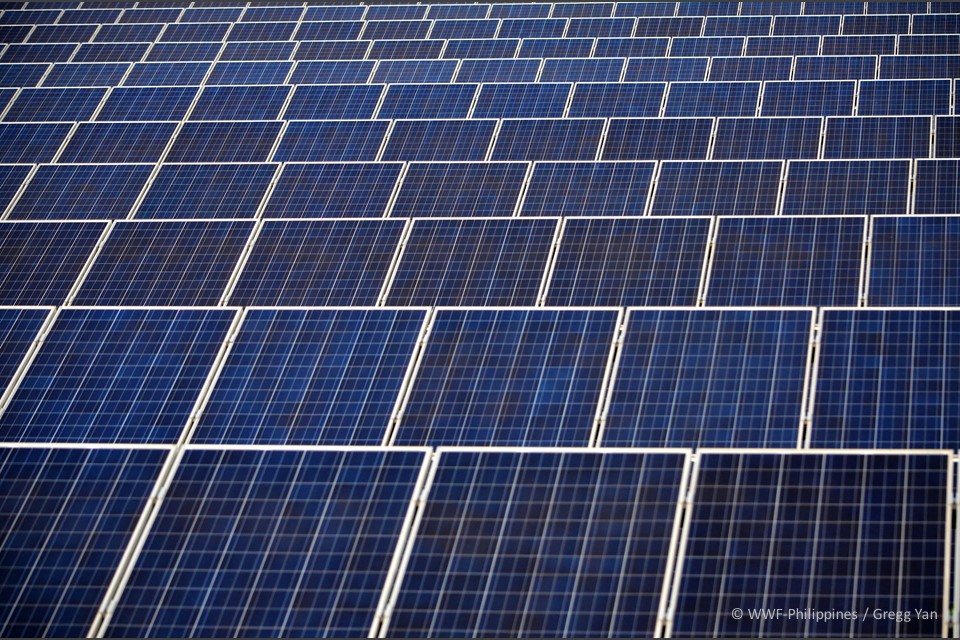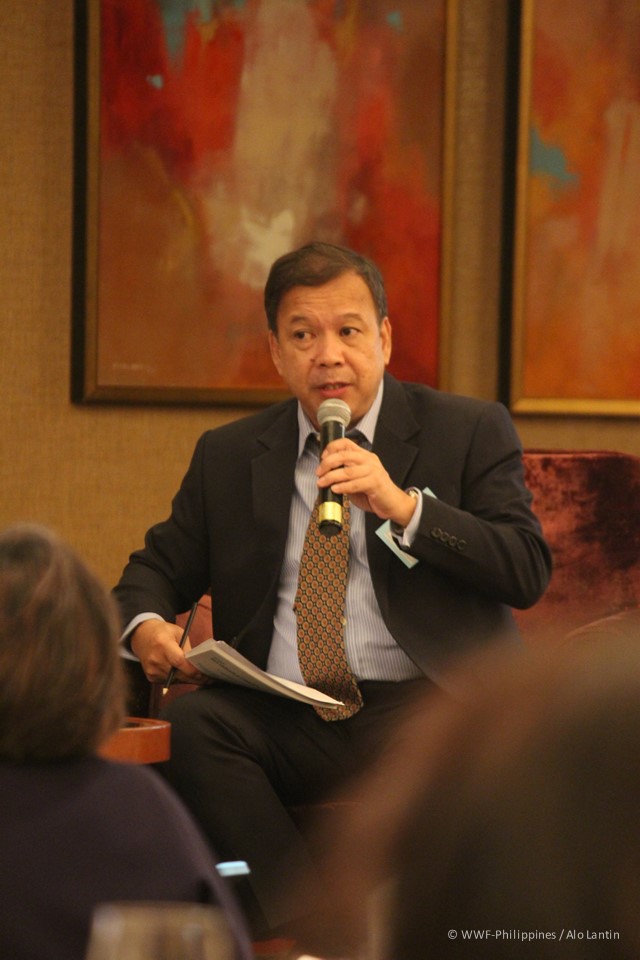Songwriting for Swans: Green Finance for A New, Better Normal
June 2020
by WWF-Philippines Chief of Party for Sustainable Finance Ed Tongson

Rows of solar panels. Consideration for green industries and Economic, Social and Governance Risks can allow the finance sector to pave the way for a sustainable post-pandemic future. Photograph © WWF-Philippines
The COVID-19 pandemic is the black – some would say, green – swan event of the 21st Century. Investors had already taken out a record-high US$100B[i] out of emerging markets in just two months alone, thrice the equivalent during the global financial crisis. The local Taal eruption in January, followed by first reported local case transmissions and ensuing lockdown in March & April, have taken their toll on the economy in a span of four months, wiping gains from the last 12 years. As a result, the economy contracted by 0.2% in the first quarter[ii]. Economists predict Q2 will be worse, with improvements only after community quarantine restrictions are eased. The double-whammy of climate impacts and COVID-19 will make the country even more vulnerable, not least because compounding risks of this nature are unprecedented. The global public health crisis adds to the list of exogenous risks broadly labeled as Environment, Social and Governance (ESG). These include climate risks, which impact on the economy and financial stability - from which the banking sector led by the Bangko Sentral ng Pilipinas (BSP) needs to prepare for.
Three years ago this month, the Task Force on Climate-related Financial Disclosures (TCFD), established by the Financial Stability Board, published its recommendations with a groundswell of support from businesses that have now grown to a total combined market cap of US$12T, and from financial institutions responsible for some US$35T in assets[iii]. Alongside the voluntary framework presented by the Task Force, is the goal of enabling a smooth transition now, towards the low-carbon economy of the future. The parallels between climate change and the coronavirus, their impact to global financial stability, and our collective responsibilities, could not be clearer.
The pandemic has hampered our ability to meet global environmental goals, and the broader sustainable development agenda. Many in the field of development feel that we have been knocked several decades backward - but we must find a way to bounce back, sustainably.
In the midst of this pandemic, we cannot afford to forget our commitments to conservation and sustainability. The future of life on Earth hangs on our ability to address the many ongoing environmental crises we are currently faced with. Now, more than ever, we must acknowledge the fact that sustainable finance can play an important role in the recovery of the economy, on short, medium, and long-term time frames. We must allow it to do so.
There are many ways in which we can structure our fiscal stimulus and financial aid packages, to speed up our transition toward an inclusive, green economy.
A significant portion of recovery plans being drawn up must aim to benefit environmentally sustainable activities. The provision of short- and medium-term economic opportunities should not lose sight of the potential for investing in transformational innovations that can contribute to the resilience of communities in the face of forthcoming challenges that may arise in the future, i.e. biodiversity loss, runaway climate change, albeit within wider timeframes. For example, mitigation of urban air pollution can lead to better health outcomes among vulnerable groups via reductions in respiratory diseases, thus increasing their resiliency to other health risks.
Furthermore, priority should be given to targeted spending for “shovel-ready” projects, that can both be dispatched immediately and with the greatest multiplier effects towards amelioration of the most deeply impacted segments of society, as well as health, social, and economic co-benefits. Alongside this must follow a systematic and transparent evaluation of the environmental impacts of such a recovery package, which may weaken the resilience of communities to emergent crises. Below are a few examples where inflection points may arise:
- Transition to sustainable energy systems. For the first time, US oil prices hit negative[iv] as producers ran out of storage space and became forced to pay buyers to take barrels they could no longer hold; prices are expected to stay at levels below those at the start of 2020, until the time when travel restrictions, and subsequently the global slump in oil, are eased. There is opportunity now to price carbon accurately in conjunction with feebates to improve energy efficiency in buildings and industries, and to rationalize subsidies from fossil fuels while optimizing renewable energy (RE) dispatch in the local energy markets a a viable solution for our future power demands given falling RE and storage deployment costs. Further, upgrades to improving the national grid can proactively contribute to resolving variable RE integration issues whilst meeting future energy demand. Lastly, the myriad off-grid areas around the country, isolated in highlands and far-flung islands, are suited for distributed RE-driven power generation systems given the abundance of waste biomass from agriculture, the volatility of oil, and the continuing national subsidization of off-grid operations under the Universal Charge on Missionary Electrification.
- Monitoring and augmenting assistance and support to micro, small and medium enterprises. According to the DTI, nearly 1 million MSMEs in the Philippines comprise over 99.5% of all registered businesses and provide for 7 out of 10 jobs in the country, with NEDA forecasting 1.8M jobs to be at risk due to the pandemic. Providing and monitoring sufficient credit facilities for MSMEs, and prioritizing public support for projects that help green business operations especially in sensitive sectors, can avert mass unemployment and foster long term resilience. A local Philippine bank has announced the forthcoming launch of the country’s first COVID bond in a bid to support MSMEs that are in need of a lifeline during the pandemic, while the BSP has slashed a total of 150 basis points in key policy rates since the start of nationwide community quarantines to enhance domestic credit and liquidity. For consumers, patronage of local enterprises where possible can help Filipino jobs and enterprise to remain afloat.
- Uphold environmental policies and standards. There is temptation to dip into the vast coffers presented by the global commons and our country’s own rich natural resources especially during times of crisis. Intergenerational equity provides that future generations may enjoy the same, if not better, environment that present generations enjoy. In more immediate terms, starting the transition to a low-carbon economy creates opportunity for green jobs and maintaining positive feedback loops, facilitating much-needed investments to restart the economy. Enforcement of environmental standards enable the continued and improved delivery of ecosystem services such as coastal erosion prevention, storm buffer, water filtration, soil health, among others.
- Re-skilling of workers in green jobs. Training support for green jobs such as sustainable agriculture, especially for displaced workers in badly hit sectors, e.g. transport, tourism, retail, can boost employment and rural development while building the human resource base for a green and inclusive recovery.
- Developing sustainable investment roadmaps. Taxonomies have been developed in the European Union and China that help define green activities and improve non-financial reporting whereby investors can outline expectations to businesses by providing a common definition of environmentally sustainable projects for all stakeholders. As a member of the ASEAN, the Philippines has been at the forefront of harmonizing standards with its neighbor Southeast Asian countries notably for the development of capital markets in the region, sustainability reporting, and sustainable finance. In 2019, the SEC has issued sustainability reporting guidelines for publicly listed companies, while more recently the BSP has issued a circular on a sustainable finance framework, with integration of environment, social and governance (ESG), as well as climate, in bank strategies and risk management frameworks. Taken altogether, sustainable finance and investment roadmaps for high-impact sectors can be developed whereby economic activities are aligned and contribute to the country’s sustainable recovery and transition.
- Explore blended finance as a means to unlock private capital to meet the Sustainable Development Agenda. With dwindling government resources to support post-COVID recovery, there will be a need to get private money back into circulation and to support the domestic financial sector in servicing communities’ and businesses’ capital and liquidity requirements. Private capital may be deployed via blended finance where concessional, subordinate capital, guarantees, grants and technical assistance from private and public multilateral sources de-risk projects otherwise avoided by private capital. Blended finance matches financing instruments (debt, equity) with the risk appetites of a range of investors - from government, private commercial banks to philanthropic organizations.
Lastly, we must take into considerations the very factors that lead to extreme events such as the ongoing pandemic, in order to prevent them from happening again. We must integrate these risks - environmental and social risks, the risks posed by pandemics, by health issues, by climate change - into our practices, so that we can be better prepared should they arise again. And they will arise again - which is why we must be ready for them.
Forward thinking is crucial at this point in time, if we are to pave a way toward a sustainable future. We need to develop green investment roadmaps, pathways forward that cut back on emissions, that avoid environmental degradation, and that address or even answer pervasive systemic issues that pose a risk not just to the economy, but to society and to all life.
The public health crisis has spurred much re-thinking of current business models, and how to pivot strategies, operations, and ultimately products, to serve the population in the new normal. At the same time, it is opportune to re-imagine what we would like to become, as some old practices have become dissonant, difficult, dated, and detrimental in recovering. And recover we must, under a new and better normal.

WWF-Philippines Chief of Party for Sustainable Finance Ed Tongson. Tongson has worked on local conservation efforts with WWF-Philippines since the organization’s founding in 1998. Photograph © Alo Lantin / WWF-Philippines
References:
[i] Bloomberg Finance LP; EPFR Global; Haver Analytics; Institute of International Finance; and IMF staff calculations
[ii] Philippine Statistics Authority
[iii] Task Force on Climate-related Financial Disclosures
[iv] Bloomberg
For more information, please contact:
Ed Tongson
Sustainable Finance, Chief of Party
etongson@wwf.org.ph
For media arrangements, please contact:
Ms. Pam Luber
Integrated Communications Manager
pluber@wwf.org.ph
